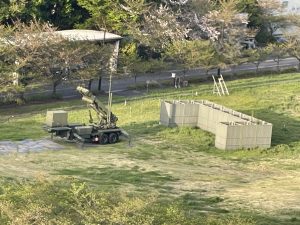78 years since the end of World War II, Japan has decided to take yet another step on the path toward becoming a “normal nation,” able to employ its military to boost its national interests like any other.
On December 22, the administration of Prime Minister Kishida Fumio revised guidelines on defense exports, allowing the transfer of finished lethal equipment, such as missiles, abroad for the first time.
This marks another major shift in the nation’s post-war policy of maintaining an exclusively defense-oriented policy, following last year’s historic decision to acquire – and possibly use – so-called “counterstrike capabilities” to strike back against enemy missile bases in the event of an armed attack on Japan.
Specifically, at the request of Washington, this time Tokyo has decided to export the Patriot Advanced Capability (PAC) system, or an air and missile defense (AMD) system, owned by Japanese Self-Defense Forces (JSDF), to the United States, where the interceptor system is licensed.
Demand for air defense systems, including Patriot surface-to-air missiles (SAMs) has significantly increased in countries such as Ukraine, Poland, Israel, and Taiwan and elsewhere in recent years. Accordingly, the U.S. has been drawing on its own missile inventory to provide those countries with missile interceptor systems. Exports from Japan will make up for its ally’s shortfall.
Japan’s Defense Minister Kihara Minoru said at a press conference on December 26 that Tokyo will mainly export PAC-2 Guidance Enhanced Missile (GEM) SAMs, which are capable of intercepting incoming aircraft and cruise missiles with a range of over 100 kilometers. He also said the defense ministry is considering exporting the PAC-3, which is capable of dealing with ballistic and cruise missiles with a shorter range of tens of kilometers compared to the PAC-2 versions.
Looking ahead, Tokyo will likely face three major challenges in realizing such lethal weapons exports.
The first challenge is that since the latest move is a fundamental policy shift for the pacifist nation, the government must gain the understanding of the people and build a national consensus. The latest relaxation in arms exports was effectively decided in closed-door discussions between a small number of lawmakers from the ruling Liberal Democratic Party and its coalition partner Komeito. There has been no discussion in open forums, including the full Diet. This will not bring about a broad-based public consensus on this issue.
According to a public opinion poll conducted by Kyodo News in July of this year, 60 percent of respondents said the export of lethal weapons should not be allowed, while 33 percent said it should be allowed. The government needs to face up to the fact that it does not yet have the understanding and support of the people for this policy shift.
The second challenge is the need to discuss how Japan should stand and behave in the international community as a peaceful nation. In particular, there is no deep debate going on in Tokyo about what Japan should do when major powers such as Russia invade another country by force. Pacifist Japanese people themselves may need to understand that although lethal weapons can be abominable tools that destroy peace, the stability and peace of the international order are also maintained and protected by the same weapons.
In a broad context, relaxing the export rules for defense equipment can be seen as an effort to put into practice the concept of “Proactive Contribution to Peace,” which is the basic principle for Japan’s national security introduced under the late Abe Shinzo’s administration. This proactive policy takes into account the realities of today’s dog-eat-dog world.
Building a multi-layered defense equipment sharing network among allies and like-minded countries will deepen security cooperation and strengthen Japan’s deterrence. This is especially necessary for Japan, which is surrounded by three nuclear-armed states — China, North Korea, and Russia — that appear to be attempting to unilaterally change the status quo by force.
From a Japanese perspective, under such severe circumstances, strengthening deterrence through mutual dependence on defense equipment will also contribute to regional stability and prosperity. In particular, as Japan’s presence in Southeast Asian countries declines and China’s presence rises, Japan’s equipment exports to Southeast Asian countries may become a trump card in the future.
The third challenge, or concern, is whether Japan’s export of PACs to the U.S. will leave the JSDF with a shortage of its own interceptor missiles. The Ministry of Defense in Tokyo estimated in October last year that the country currently only holds around 60 percent of the interceptor missiles needed to defend the country.
In a dire situation, Japan’s transfer of Patriot missiles to the U.S. could paradoxically end up pleasing China and North Korea, which are developing new missiles, including hypersonic missiles, of their own.
Asked about this point, Kihara said at the press conference, “I think it will be possible to improve the operation of anti-air missiles for the entire Self-Defense Forces, including the Ground, Maritime, and Air Forces. There are various types of anti-air missiles, and the Patriot is not the only one, so we must take measures to ensure that we do not leave any holes in our nation’s defenses.”
Ultimately, exporting defense equipment contributes to improving the deterrence of Japan, its allies, and the like-minded countries with which it has a cooperative relationship in the field of security. This is a world of mutual support, or a system of collective security in different words.
Now is the time for Japan, as a normal democratic country, to not just have this option but make full use of it by working to secure profound national consensus on this issue.

































